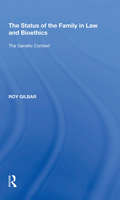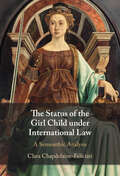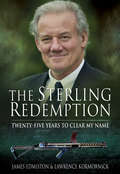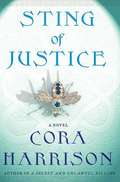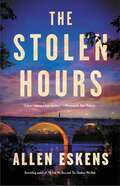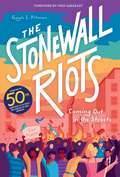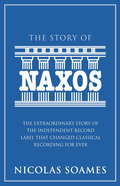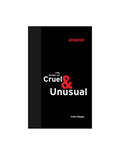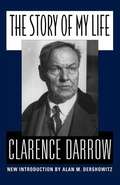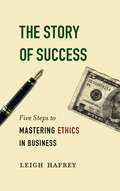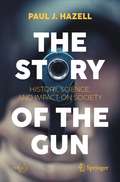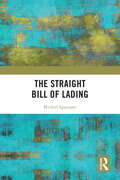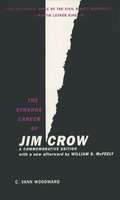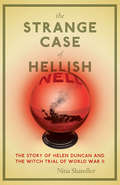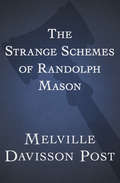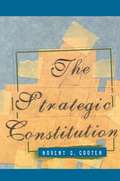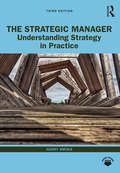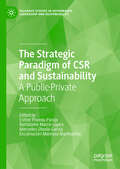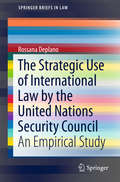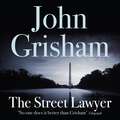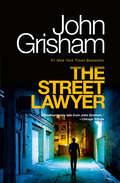- Table View
- List View
The Status of the Family in Law and Bioethics: The Genetic Context
by Roy GilbarWhere do a doctor's responsibilities lie in communicating diagnostic and predictive genetic information to a patient's family members? On the one hand, a patient may wish to retain confidentiality while the relatives seek information; on the other, a patient may wish to share the information while the relatives would rather not know. This volume investigates the doctor's professional legal and ethical obligations in the context of these two familial tensions. The examination is conducted within the liberal-communitarian debate, whereby the two philosophies hold different perceptions of the individual and the relationship he or she has with others. Within this theoretical framework, the book examines the approach taken by English medical law and ethics to the communication of genetic information to family members. Legally, the focus is on tort law and the law of confidentiality. Ethically, it concentrates on the approach taken by the bioethical literature, and more specifically by codes of ethics and professional guidelines.
The Status of the Girl Child under International Law: A Semioethic Analysis
by Clara Chapdelaine-FeliciatiClara Chapdelaine-Feliciati offers the first comprehensive study of the status of the girl child under international law. This book significantly contributes to bridging two fields usually studied separately: law and semiotics. The author engages in the novel legal semiotics theory to decode the meaning of international treaties (mainly the Convention on the Rights of the Child, Convention on the Elimination of All Forms of Discrimination Against Women, and International Covenants) and assess whether the provisions, as formulated, clearly identify the girl child and take into account the obstacles she faces as a result of sexism, childism, and intersectional discrimination. This is also the first book to apply The Significs Meaning Triad – Sense, Meaning, Significance – in international law, and Semioethics for both a diagnosis and prognosis of problematic signs in view of modifying the wording of relevant treaties.
The Sterling Redemption: Twenty-Five Years to Clear My Name
by James Edmiston Lawrence KormornickThe fight against a false accusation in the Arms-to-Iraq affair. &“A searing expose of one of the most shameful and cynical prosecutions of modern times.&” —The Guardian This is the untold true story of James Edmiston who suffered an extraordinary miscarriage of justice in 1983 when senior officials blocked vital witnesses coming to his trial which led to a personal tragedy; a broken marriage, and the loss of a business. The book explains how he was wrongly charged with alleged illegal exports to Iraq, and then took on the establishment against seemingly impossible odds for twenty-five years, to establish his innocence and to win record compensation from the British government in a truly remarkable case. Divorced and bankrupted, he is now rebuilding a shattered life, nearly thirty years later. This extraordinary story is a fascinating insight into government and the abuse of power and is based on many original sources including the Scott Report and Judgment of the Court of Appeal (criminal). The co-author, Lawrence Kormornick, is a Solicitor-Advocate (civil) who has represented Edmiston and several other victims of the Arms-to-Iraq prosecution scandal against the government and has a unique insight into these cases. Packed with ironies, twists of fate, and many unanswered questions it is a compelling read for anyone interested in political intrigue and abuse of power, miscarriage of justice, and learning about how an individual took on the state and won. &“A true story of alleged skulduggery and, possibly, criminal acts in the form of perverting the course of justice by the authorities and it should be bedside reading for everybody who believes in the rule of law.&” —The Law Society Gazette
The Sting of Justice: A Mystery of Medieval Ireland (Burren Mysteries #3)
by Cora HarrisonThe year is 1509 and autumn has come to western Ireland. When Mara attends the funeral of a local priest, the last thing she expects to discover is a corpse on the church steps. As Mara investigates, she is determined to bring a killer to justice.
The Stolen Hours
by Allen EskensA woman finds herself in a race not only for justice but for her life in this "riveting, hold-your-breath" new mystery from the bestselling author of The Life We Bury (Karin Slaughter, New York Times bestselling author of The Silent Wife).Lila Nash is on the verge of landing her dream job—working as a prosecutor under the Hennepin County Attorney—and has settled into a happy life with her boyfriend, Joe Talbert. But when a woman is pulled from the Mississippi River, barely alive, things in the office take a personal turn. The police believe the woman&’s assailant is local photographer Gavin Spenser, but the case quickly flounders as the evidence wears thin. It seems Gavin saw this investigation coming—and no one can imagine how carefully he has prepared.The more determined Lila is to put Gavin behind bars, the more elusive justice becomes. Battling a vindictive new boss and haunted by the ghosts of her own unspeakable attack, which she&’s kept a dark secret for eight long years, Lila knows the clock is ticking down. In a race against an evil mastermind, it will take everything Lila&’s got to outsmart a killer—and to escape the dark hold of her own past.&“In The Stolen Hours, there&’s not a moment misplaced or a second lost. With the precision of a watchmaker, Eskens assembles the fine parts of a mystery and sets them to the tempo of a thriller, leaving the reader breathless.&” —Craig Johnson, author of the Walt Longmire Mysteries
The Stonewall Riots: Coming out in the Streets
by Gayle E. PitmanThis book is about the stonewall riots, a series of spontaneous, often violent demonstrations by members of the gay (lgbtq+) community in reaction to a police raid that took place in the early morning hours of June 28, 1969, at the stonewall inn in the Greenwich village neighbourhood of Manhattan, new York City. The riots are attributed as the Spark that ignited the lgbtq+ movement. The author describes American gay history leading up to the riots, the riots themselves, and the aftermath, and includes her interviews of people involved or witnesses, including a woman who was ten at the time. Profusely illustrated, the book includes contemporary photos, newspaper clippings, and other period objects. A timely and necessary read, the stonewall riots helps readers to understand the history and legacy of the lgbtq+ movement.
The Story Of Naxos: The Extraordinary Story of the Independent Record Label that Changed Classical Recording for Ever
by Nicolas SoamesIn 1987, a budget classical record label was started in Hong Kong by Klaus Heymann, a German businessman who loved classical music. Swiftly, it gained a world wide reputation for reliable new digital recordings of the classics at a remarkably low price. Despite opposition from the classical record establishment, it grew at a remarkable pace, and soon expanded into opera, early music, contemporary music and specialist repertoire so that it became appreciated by specialist collectors as well as the general music lover. It is now the leading provider of classical music and as an innovator in digital delivery. At the heart of Naxos is one man: Klaus Heymann. The combination of his broad knowledge of classical music and his acute business acumen has enabled him to build the most varied classical music label in the world, but also the most effective distribution network to ensure that his recordings are available everywhere. This fascinating story explains how it happened, how a one-time tennis coach in Frankfurt became a classical recording mogul in Hong Kong and how, at the age of 75, he still holds the reins as firmly as ever.
The Story Of Naxos: The extraordinary story of the independent record label that changed classical recording for ever
by Nicolas SoamesIn 1987, a budget classical record label was started in Hong Kong by Klaus Heymann, a German businessman who loved classical music. Swiftly, it gained a world wide reputation for reliable new digital recordings of the classics at a remarkably low price. Despite opposition from the classical record establishment, it grew at a remarkable pace, and soon expanded into opera, early music, contemporary music and specialist repertoire so that it became appreciated by specialist collectors as well as the general music lover. It is now the leading provider of classical music and as an innovator in digital delivery. At the heart of Naxos is one man: Klaus Heymann. The combination of his broad knowledge of classical music and his acute business acumen has enabled him to build the most varied classical music label in the world, but also the most effective distribution network to ensure that his recordings are available everywhere. This fascinating story explains how it happened, how a one-time tennis coach in Frankfurt became a classical recording mogul in Hong Kong and how, at the age of 75, he still holds the reins as firmly as ever.
The Story Of Naxos: The extraordinary story of the independent record label that changed classical recording for ever
by Nicolas SoamesIn 1987, a budget classical record label was started in Hong Kong by Klaus Heymann, a German businessman who loved classical music. Swiftly, it gained a world wide reputation for reliable new digital recordings of the classics at a remarkably low price. Despite opposition from the classical record establishment, it grew at a remarkable pace, and soon expanded into opera, early music, contemporary music and specialist repertoire so that it became appreciated by specialist collectors as well as the general music lover. It is now the leading provider of classical music and as an innovator in digital delivery. At the heart of Naxos is one man: Klaus Heymann. The combination of his broad knowledge of classical music and his acute business acumen has enabled him to build the most varied classical music label in the world, but also the most effective distribution network to ensure that his recordings are available everywhere. This fascinating story explains how it happened, how a one-time tennis coach in Frankfurt became a classical recording mogul in Hong Kong and how, at the age of 75, he still holds the reins as firmly as ever.
The Story of Child Labor Laws (Cornerstones of Freedom)
by R. Conrad SteinTraces the history of laws that were passed during the early twentieth century to end the exploitation of child laborers that had been widespread since the beginning of the industrial revolution.
The Story of Cruel and Unusual (Boston Review)
by Colin DayanA searing indictment of the American penal system that finds the roots of the recent prisoner abuse at Abu Ghraib and Guantánamo in the steady dismantling of the Eighth Amendment's prohibition of "cruel and unusual" punishment. The revelations of prisoner abuse and torture at Abu Ghraib and more recently at Guantánamo were shocking to most Americans. And those who condemned the treatment of prisoners abroad have focused on U.S. military procedures and abuses of executive powers in the war on terror, or, more specifically, on the now-famous White House legal counsel memos on the acceptable limits of torture. But in The Story of Cruel and Unusual, Colin Dayan argues that anyone who has followed U.S. Supreme Court decisions regarding the Eighth Amendment prohibition of "cruel and unusual" punishment would recognize the prisoners' treatment at Abu Ghraib and Guantánamo as a natural extension of the language of our courts and practices in U.S. prisons. In fact, it was no coincidence that White House legal counsel referred to a series of Supreme Court decisions in the 1980s and 1990s in making its case for torture. Dayan traces the roots of "acceptable" torture to slave codes of the nineteenth century that deeply embedded the dehumanization of the incarcerated in our legal system. Although the Eighth Amendment was interpreted generously during the prisoners' rights movement of the late 1960s and 1970s, this period of judicial concern was an anomaly. Over the last thirty years, Supreme Court decisions have once again dismantled Eighth Amendment protections and rendered such words as "cruel" and "inhuman" meaningless when applied to conditions of confinement and treatment during detention. Prisoners' actual pain and suffering have been explained away in a rhetorical haze—with rationalizations, for example, that measure cruelty not by the pain or suffering inflicted, but by the intent of the person who inflicted it. The Story of Cruel and Unusual is a stunningly original work of legal scholarship, and a searing indictment of the U.S. penal system.
The Story of My Life
by Clarence S. DarrowThe Story of My Life recounts, and reflects on, Clarence Darrow's more than fifty years as a corporate, labor, and criminal lawyer, including the most celebrated and notorious cases of his day: establishing the legal right of a union to strike in the Woodworkers' Conspiracy Case; exposing, on behalf of the United Mine Workers, the shocking conditions in the mines and the widespread use of child labor; defending Leopold and Loeb in the Chicago "thrill" murder case; defending a teacher's right to present the Darwinian theory of evolution in the famous Scopes trial; fighting racial hatred in the Sweet anti-Negro and the Scottsboro cases; and much more. Written in his disarming, conversational style, and full of refreshingly relevant views on capital punishment, civil liberties, and the judicial system, Darrow's autobiography is a fitting final summation of a remarkable life.
The Story of Success
by Leigh HafreyAn innovative business book positioning ethical practice as the cornerstone of success"Business ethics? Isn't that an oxymoron?" As a lecturer in ethics, communication, and leadership at MIT's Sloan School of Management and a moderator of the Aspen Executive Seminar, Leigh Hafrey has heard time and again that ethics and business don't mix. In The Story of Success: Five Steps to Mastering Ethics in Business, Hafrey draws on fifteen years of conversations with businesspeople at all stages of their careers, from MBA to Chairman of the Board, to articulate five steps that generate ethical practice:1. Speak Up, Speak Out: define your managerial style2. See the Big Picture: recognize the forces that affect your practice3. Break the Rules, Make the Rules, Absorb the Costs: drive change, and know it4. Tell Good Stories: find stories that bring out the best in your people and yourself5. Test for Truth: distinguish fact from fantasy in your story-tellingHafrey illustrates these five steps through contemporary books and movies: to show how we elaborate a managerial style from early childhood, he discusses adult readings of Du Bose Heyward's classic children's tale, The Country Bunny and the Little Gold Shoes; to explain professional standards, he quotes Chinese MBA's on the warrior code of characters in Ang Lee's Academy Award-winning film Crouching Tiger, Hidden Dragon. Hafrey juxtaposes these reports with real-life businesspeople' s stories of career challenge and personal success, and speculates on the way in which American business values increasingly shape and will be shaped by global culture.
The Story of the Gun: History, Science, and Impact on Society (Springer Praxis Books)
by Paul J. HazellThis engaging and accessible book explains the scientific principles behind guns, both ancient and modern. It connects their evolution to advances in science, as well as tracing the developments of projectiles and propellants. It is not limited to small arms but also looks at the science of enormous guns such the Paris Gun, for example, and reviews the efforts to build a gun to launch projectiles into space. Extremely fast guns are also covered, such as two-stage guns and rail guns. Further, the book provides insight into the science of terminal ballistics and wound ballistics as well as the challenging subject of gun control. It is full of interesting facts for all who are curious about the science and history of guns, as well as those for whom the gun is an accessory of their profession.
The Story of the Powers of the Supreme Court (Cornerstones of Freedom)
by R. Conrad SteinA brief overview explaining how the Supreme Court is the ultimate interpreter of our Constitution.
The Straight Bill of Lading
by Michiel SpanjaartThe bill of lading has been the subject of numerous articles, dissertations, and textbooks over the years, and this is hardly surprising. The bill of lading has a fascinating history, it has several functions with roots in both contract and property law, and its issuance may trigger the application of an international convention on the carriage of goods by sea, the Hague–Visby Rules. Whereas most books on the subject deal with the bill of lading in general, this book zooms in on the straight bill of lading and covers the differences (and similarities) with a negotiable (order or bearer) bill of lading.
The Strange Career of Jim Crow
by C. Vann Woodward William S. McFeely (afterword]C. Vann Woodward, who died in 1999 at the age of 91, was America's most eminent Southern historian, the winner of a Pulitzer Prize for Mary Chestnut's Civil War and a Bancroft Prize for The Origins of the New South. Now, to honor his long and truly distinguished career, Oxford is pleased to publish this special commemorative edition of Woodward's most influential work, The Strange Career of Jim Crow. The Strange Career of Jim Crow is one of the great works of Southern history. Indeed, the book actually helped shape that history. Published in 1955, a year after the Supreme Court in Brown v. Board of Education ordered schools desegregated, Strange Career was cited so often to counter arguments for segregation that Martin Luther King, Jr. called it "the historical Bible of the civil rights movement. " The book offers a clear and illuminating analysis of the history of Jim Crow laws, presenting evidence that segregation in the South dated only to the 1890s. Woodward convincingly shows that, even under slavery, the two races had not been divided as they were under the Jim Crow laws of the 1890s. In fact, during Reconstruction, there was considerable economic and political mixing of the races. The segregating of the races was a relative newcomer to the region. Hailed as one of the top 100 nonfiction works of the twentieth century, The Strange Career of Jim Crow has sold almost a million copies and remains, in the words of David Herbert Donald, "a landmark in the history of American race relations. "
The Strange Case of Hellish Nell: The Story of Helen Duncan and the Witch Trial of World War II
by Nina ShandlerOn March 23, 1944, as the allied forces prepared for D-Day, Britain’s most famous psychic, Helen Duncan-"Nell” to her family-stood in the dock of Britain’s highest criminal court accused of. . . witchcraft. It was a trial so bizarre Winston Churchill grumbled, "Why all this tomfoolery?” But the Prime Minister was not privy to the Military Intelligence agenda fueling the prosecution: Duncan’s séances were accurately revealing top-secret British ship movements. The authorities wanted "Hellish Nell” silenced. Using diaries, personal papers, interviews, and declassified documents, Nina Shandler resurrects this strange courtroom episode and the shadowy world of wartime secrets and psychics. Sometimes comic, sometimes tragic, The Strange Case of Hellish Nell is a true crime tale laced with supernatural phenomena and wartime intrigue.
The Strange Schemes of Randolph Mason
by Melville Davisson PostThrilling stories starring America’s smartest—and most unscrupulous—lawyer During the gold rush, Richard Warren and Samuel Walcott set out from New York to strike it rich. When fortune does not find them, Samuel saves himself from the gutter by marrying a saloonkeeper’s daughter. Jealous of his friend’s beautiful wife, Richard kills Samuel and flees the desert with the woman and a trove of stolen gold dust. He assumes his dead friend’s identity and makes a name for himself in New York—until the woman he killed for turns out to be a blackmailer. Desperate, Richard turns to the mysterious lawyer Randolph Mason. A crooked genius, Mason doesn’t mind having a killer for a client, and will do whatever he can to help Richard escape justice. In this brilliantly original story collection, Mason follows the letter of the law while gleefully betraying its spirit. This ebook has been professionally proofread to ensure accuracy and readability on all devices.
The Strategic Constitution
by Robert D. CooterMaking, amending, and interpreting constitutions is a political game that can yield widespread suffering or secure a nation's liberty and prosperity. Given these high stakes, Robert Cooter argues that constitutional theory should trouble itself less with literary analysis and arguments over founders' intentions and focus much more on the real-world consequences of various constitutional provisions and choices. Pooling the best available theories from economics and political science, particularly those developed from game theory, Cooter's economic analysis of constitutions fundamentally recasts a field of growing interest and dramatic international importance. By uncovering the constitutional incentives that influence citizens, politicians, administrators, and judges, Cooter exposes fault lines in alternative forms of democracy: unitary versus federal states, deep administration versus many elections, parliamentary versus presidential systems, unicameral versus bicameral legislatures, common versus civil law, and liberty versus equality rights. Cooter applies an efficiency test to these alternatives, asking how far they satisfy the preferences of citizens for laws and public goods. To answer Cooter contrasts two types of democracy, which he defines as competitive government. The center of the political spectrum defeats the extremes in "median democracy," whereas representatives of all the citizens bargain over laws and public goods in "bargain democracy." Bargaining can realize all the gains from political trades, or bargaining can collapse into an unstable contest of redistribution. States plagued by instability and contests over redistribution should move towards median democracy by increasing transaction costs and reducing the power of the extremes. Specifically, promoting median versus bargain democracy involves promoting winner-take-all elections versus proportional representation, two parties versus multiple parties, referenda versus representative democracy, and special governments versus comprehensive governments. This innovative theory will have ramifications felt across national and disciplinary borders, and will be debated by a large audience, including the growing pool of economists interested in how law and politics shape economic policy, political scientists using game theory or specializing in constitutional law, and academic lawyers. The approach will also garner attention from students of political science, law, and economics, as well as policy makers working in and with new democracies where constitutions are being written and refined.
The Strategic Manager: Understanding Strategy in Practice
by Harry SminiaThe Strategic Manager provides a comprehensive, logical, and applied insight in strategic management. Unlike some more theory-heavy texts, this book focuses on how strategy works in everyday practice, taking readers’ expectations and understanding beyond that of strategy as a matter of planning only. It enables the reader to learn and reflect upon their practical skills and knowledge, and critically evaluate the strategy process and their own strategic decision-making. The book is based around six different strategy theories, individually presented and supplemented with useful lists of questions that encourage readers to become competent strategic thinkers. This third edition has been fully updated throughout, including fresh case studies and examples from across Asia, Africa, and South America that bridge theory with practice, new strategy practice boxes considering the importance of cooperation and strategic alliances, and reflective questions to aid understanding. Essential reading for postgraduate students of strategic management, MBA students, and those in executive education, this text will also be a useful tool for reflective managers trying to develop a better understanding. Online resources include chapter-by-chapter PowerPoint slides.
The Strategic Paradigm of CSR and Sustainability: A Public-Private Approach (Palgrave Studies in Governance, Leadership and Responsibility)
by Bartolomé Marco-Lajara Esther Poveda-Pareja Mercedes Úbeda-García Encarnación Manresa-MarhuendaIt has become increasingly clear that promotion of sustainability initiatives by governments and other public institutions alone is not enough to bring about the necessary progress in tackling the ‘Grand Challenges’ of climate change and inequality. A higher level of involvement is required from companies, as the main agents of economic development. Therefore, research is needed to determine how the desired levels of sustainability can be achieved through each of the spheres (public and private) as well as by considering collaboration between both. This book analyses Corporate Social Responsibility (CSR) and sustainability from a public-private perspective, considering the actions of stakeholders belonging to both the private and public scopes, their ability to collaborate and the paradigmatic relationship between CSR and sustainability as it moves across the public and private spheres. It will be of great interest to students and scholars of sustainability strategy, CSR, policy and corporate governance, as well as internal and external stakeholders engaged in corporate policy and strategic management.
The Strategic Use of International Law by the United Nations Security Council
by Rossana DeplanoThe book offers insights on whether international law can shape the politics of the Security Council and conversely, the extent to which the latter contribute to the development of international law. By providing a systematic analysis of the quantity and quality of international legal instruments referred to in the text of resolutions, the book reconstructs patterns of the Security Council's behavioural regularities and assesses them against the provisions of the United Nations Charter, which establishes its mandate. The analysis is divided into three periods - the origins and Cold War period, post-Cold War period and the twenty-first century - and assesses the resolutions passed in each period by thematic category. The book argues that while international law plays an important role in shaping the politics of the Security Council, the Council's resolutions do not contribute significantly to the development of international law.
The Street Lawyer
by John GrishamMichael was in a hurry. He was scrambling up the ladder at Drake & Sweeney, a giant D.C. law firm with eight hundred lawyers. The money was good and getting better; a partnership was three years away. He was a rising star with no time to waste, no time to stop, no time to toss a few coins into the cups of panhandlers. No time for a conscience.But a violent encounter with a homeless man stopped him cold. Michael survived; his assailant did not. Who was this man? Michael did some digging, and learned that he was a mentally ill veteran who'd been in and out of shelters for many years. Then Michael dug a little deeper, and found a dirty secret, and the secret involved Drake & Sweeney.The fast track derailed; the ladder collapsed. Michael bolted the firm and took a top-secret file with him. He landed in the streets, an advocate for the homeless, a street lawyer."Fluent and fascinating. Few writers have so much to say, the skills to make reading what they say an irresistible pleasure -- and the clout to be able to say it to an audience of millions." Independent(P)1998 Random House, LLC
The Street Lawyer: A Novel (Pearson English Active Readers Ser.)
by John Grisham#1 NEW YORK TIMES BESTSELLER • Michael Brock is billing the hours, making the money, rushing relentlessly to the top of Drake & Sweeney, a giant D.C. law firm. One step away from partnership, Michael has it all. Then, in an instant, it all comes undone. A homeless man takes nine lawyers hostage in the firm&’s plush offices. When it is all over, the man&’s blood is splattered on Michael&’s face—and suddenly Michael is willing to do the unthinkable. Rediscovering a conscience he lost long ago, Michael is leaving the big time for the streets where his attacker once lived—and where society&’s powerless need an advocate for justice. But there&’s one break Michael can&’t make: from a secret that has floated up from the depths of Drake & Sweeney, from a confidential file that is now in Michael&’s hands, and from a conspiracy that has already taken lives. Now Michael&’s former partners are about to become his bitter enemies. Because to them, Michael Brock is the most dangerous man on the streets.Don&’t miss John Grisham&’s new book, THE EXCHANGE: AFTER THE FIRM!
